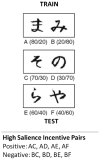Stress modulates reinforcement learning in younger and older adults
- PMID: 22946523
- PMCID: PMC3516629
- DOI: 10.1037/a0029823
Stress modulates reinforcement learning in younger and older adults
Abstract
Animal research and human neuroimaging studies indicate that stress increases dopamine levels in brain regions involved in reward processing, and stress also appears to increase the attractiveness of addictive drugs. The current study tested the hypothesis that stress increases reward salience, leading to more effective learning about positive than negative outcomes in a probabilistic selection task. Changes to dopamine pathways with age raise the question of whether stress effects on incentive-based learning differ by age. Thus, the present study also examined whether effects of stress on reinforcement learning differed for younger (age 18-34) and older participants (age 65-85). Cold pressor stress was administered to half of the participants in each age group, and salivary cortisol levels were used to confirm biophysiological response to cold stress. After the manipulation, participants completed a probabilistic learning task involving positive and negative feedback. In both younger and older adults, stress enhanced learning about cues that predicted positive outcomes. In addition, during the initial learning phase, stress diminished sensitivity to recent feedback across age groups. These results indicate that stress affects reinforcement learning in both younger and older adults and suggests that stress exerts different effects on specific components of reinforcement learning depending on their neural underpinnings.
Figures



References
-
- Abercrombie ED, Keefe KA, DiFrischia DS, Zigmond MJ. Differential effect of stress on in vivo dopamine release in striatum, nucleus accumbens, and medial frontal cortex. Journal of Neurochemistry. 1989;52:1655–1658. - PubMed
-
- American Psychological Association. Stress in America Washington DC report. Washington, DC: Harris Interactive Inc., Public Affairs and Policy; 2008.
-
- Anstrom KK, Woodward DJ. Restraint increases dopaminergic burst firing in awake rats. Neuropsychopharmacology. 2005;30:1832–1840. - PubMed
-
- Bäckman L, Lindenberger U, Li SC, Nyberg L. Linking cognitive aging to alterations in dopamine neurotransmitter functioning: recent data and future avenues. Neuroscience and Biobehavioral Reviews. 2010;34:670–677. - PubMed
-
- Bäckman L, Nyberg L, Lindenberger U, Li SC, Farde L. The correlative triad among aging, dopamine, and cognition: current status and future prospects. Neuroscience and Biobehavioral Reviews. 2006;30:791–807. - PubMed
Publication types
MeSH terms
Substances
Grants and funding
LinkOut - more resources
Full Text Sources
Other Literature Sources
Medical

